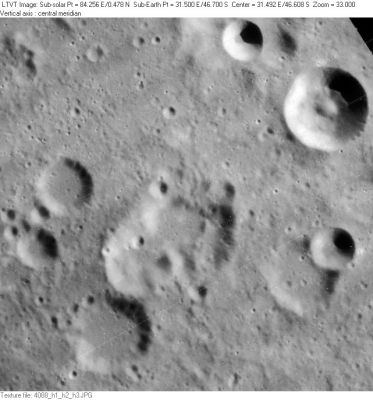Dove
Contents
Dove
|
Lat: 46.7°S, Long: 31.5°E, Diam: 30 km, Depth: 1.74 km, Rükl: 67 |
LO-IV-088H Dove is the relatively small, irregular depression just below center. Its floor extends to the southwest into the overlapping 19-km Dove C. The more sharply defined crater with the fluted walls to their lower left is 25-km Pitiscus B. To the west of Dove and Dove C are 16-km Pitiscus K (top) and 13-km Pitiscus F (bottom). To the east is 13-km Dove A overlaying 19-km Dove B. In the upper right corner, the 24 km crater with the classic Alpetragius-like central peak is Lockyer G. To its northeast is crisply carved 13-km Lockyer J.
Images
LPOD Photo Gallery Lunar Orbiter Images Apollo Images
Maps
(LAC zone 113C3) LAC map Geologic map
Description
Description: Wikipedia
Additional Information
Depth data from Kurt Fisher database
- Westfall, 2000: 1.74 km
- Viscardy, 1985: 1.6 km
Nomenclature
- Heinrich Wilhelm Dove (10/6/1803 - 4/4/1879) was a German physicist. During his career he published more than 300 papers, some of which delved into experimental physics. He also had an important influence over the science of meteorology, and was considered by some to be a pioneer in this field; Dove's primary meteorological focus was in climatology, a field pioneered by Alexander von Humboldt.
- According to Whitaker (p. 224), this name was introduced by Schmidt.
LPOD Articles
Bibliography
